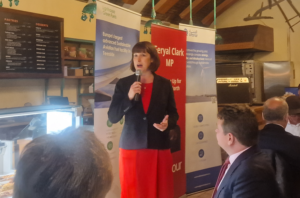How Danfoss embedded a culture of performance management
- 3 Min Read
Kent Frederiksen, Head of Total Rewards – Center of Excellence and Bojana Zupanic, Head of Succession at Danfoss joined HRD Connect to discuss how Danfoss re-invented their global performance management process to align to the business strategy and create a culture of accountability, transparency and sustainable growth. What was the impetus behind your transformation project? Back […]
- Author: Rachel Montgomery-Young
- Date published: Dec 7, 2017
- Categories

Kent Frederiksen, Head of Total Rewards – Center of Excellence and Bojana Zupanic, Head of Succession at Danfoss joined HRD Connect to discuss how Danfoss re-invented their global performance management process to align to the business strategy and create a culture of accountability, transparency and sustainable growth.
What was the impetus behind your transformation project?
Back in 2009 the performance management system was a bit chaotic. It wasn’t transparent and it was very scattered. At the time we got a new CEO, we had the first financial loss we understood the need to do something. And within that we wanted to create more transparency and set a much better direction for the business because it had become very siloed.
So we ran an in-depth analysis, with external advice, to find out how the business was running. In that process we found out that there were businesses that were losing money and always had been. And we needed to make a decision on what was core and not core. So that transparency was key at the start to understand where we were.
And then going forward we put in place a much stricter approach on how we run the business: so that meant more transparency in the financial results, target setting and so on. And with that came a huge game changer which was, and is, our quarterly business review meetings where the executive team would meet on a regular basis with the business leaders to go through the financial performance and look at where it needs to achieve the set objectives.
How does performance management play into this?
So the whole performance management side came into play at that time, with the business getting their heads around where it was doing well and where it wasn’t not doing so well; and what are we doing about it and how are we following it up. With that came a desire to have the whole organisation with us on that journey. So we decided in 2009 to introduce incentives to everybody in the global workforce.
And with that came objectives to be set and followed up on, with a much clearer link to what needed to be delivered and the rewards received for achieving it. And that led to the development of what we call Danfoss Business Systems: an operating system, a process of ensuring that we had high quality in the factories, low errors per product produced, better safety, training of sales staff, the whole shebang. And that includes ensuring that the way we manufacture the machinery – the engine room as we call it – is much more efficient. And we have been harvesting a minimum 10% ongoing productivity improvement over the last few years.
What about ongoing improvements?
The final step of our journey focuses on how we can upgrade overall talent management by simplifying and consolidating the approach, and then following the same principle of getting the basics right and executing that in a very rigorous way.
This needs to be continually tweaked, because it’s not that we haven’t done it right, but we have not been very good at executing it and following up. And the other parts: performance management, setting objectives, following up, development and so on have been working well for years; and we’re doing employee surveys twice a year to make sure that we do this and then following up on the results.








